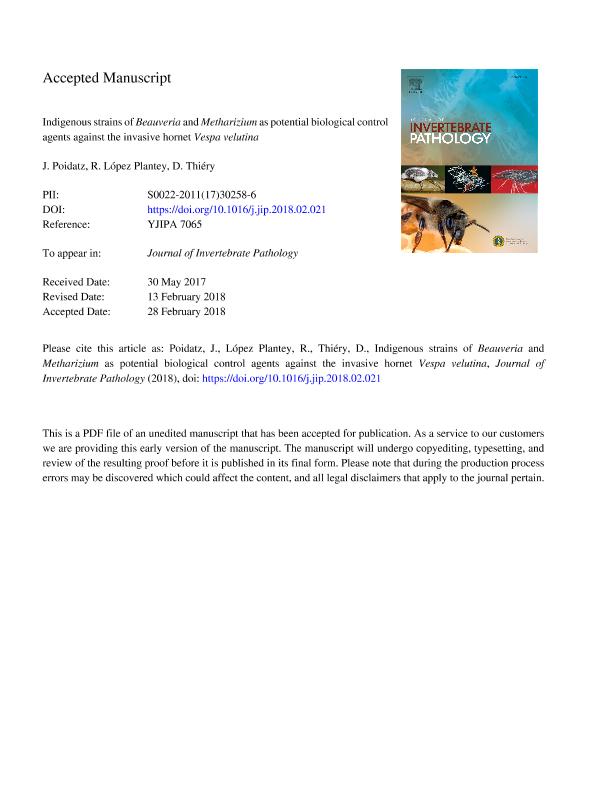Artículo
Indigenous strains of Beauveria and Metharizium as potential biological control agents against the invasive hornet Vespa velutina
Fecha de publicación:
03/2018
Editorial:
Academic Press Inc Elsevier Science
Revista:
Journal of Invertebrate Pathology
ISSN:
0022-2011
Idioma:
Inglés
Tipo de recurso:
Artículo publicado
Clasificación temática:
Resumen
Alien species often miss parasites in their invaded area, and this is the case in Vespa velutina. This invasive hornet predator of bees was accidentally introduced in Europe from East China in 2004. The control of this species is still problematic. Indeed to destroy nests, applicators currently use large spectrum insecticides, which is too costly or dangerous to applicators and also to the environment, affecting non-targeted arthropods (one period). Studying the potential interest of biological control methods may help to propose alternatives in V. velutina control. We present here the bioassays in which we assessed the potential control efficiency of different indigenous French isolates of entomopathogenic fungi. We inoculated adults V. velutina by different ways: being directly, by walking on a contaminated surface, in the food, or by inter-individual transfers. We tested differences between the isolates and the application methods using two parameters mortality and LT50. The direct inoculation method was the most efficient modality, then the contact, transfer and food. Considering all contamination methods, there was no difference on susceptibility or mortality among different isolates. Still the LT50 was quite short in all isolates (average 5.8 ± 0.44d), and their virulence was quite high: we conclude that there is high potential in using such entomopathogens as a biological control agent against V. velutina.
Palabras clave:
ASIAN HORNET
,
BEAUVERIA BASSIANA
,
BIOLOGICAL CONTROL
,
METARHIZIUM ROBERTSII
Archivos asociados
Licencia
Identificadores
Colecciones
Articulos(IBAM)
Articulos de INST.DE BIOLOGIA AGRICOLA DE MENDOZA
Articulos de INST.DE BIOLOGIA AGRICOLA DE MENDOZA
Citación
Poidatz, J.; López Plantey, Rodrigo Javier; Thiéry, D.; Indigenous strains of Beauveria and Metharizium as potential biological control agents against the invasive hornet Vespa velutina; Academic Press Inc Elsevier Science; Journal of Invertebrate Pathology; 153; 3-2018; 180-185
Compartir
Altmétricas




